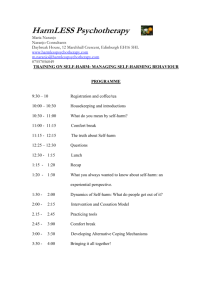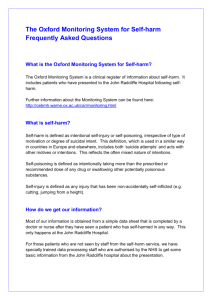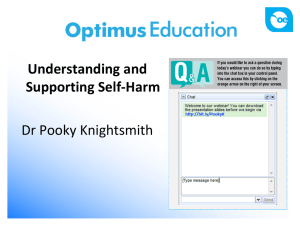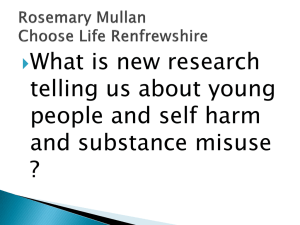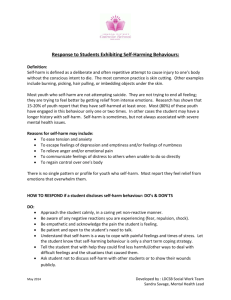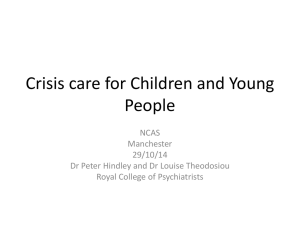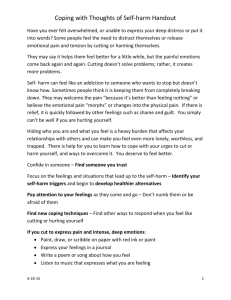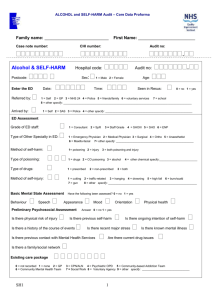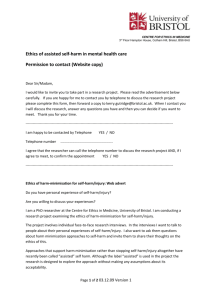Tackling Self-harm Stigma - Dignity in Care (doc
advertisement
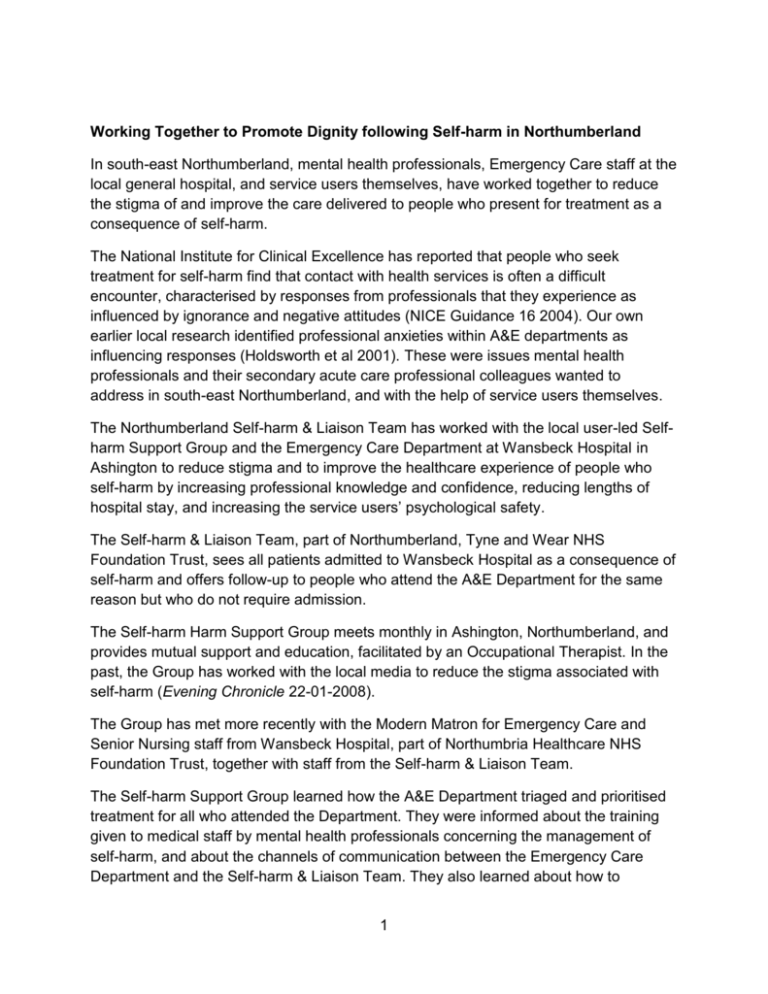
Working Together to Promote Dignity following Self-harm in Northumberland In south-east Northumberland, mental health professionals, Emergency Care staff at the local general hospital, and service users themselves, have worked together to reduce the stigma of and improve the care delivered to people who present for treatment as a consequence of self-harm. The National Institute for Clinical Excellence has reported that people who seek treatment for self-harm find that contact with health services is often a difficult encounter, characterised by responses from professionals that they experience as influenced by ignorance and negative attitudes (NICE Guidance 16 2004). Our own earlier local research identified professional anxieties within A&E departments as influencing responses (Holdsworth et al 2001). These were issues mental health professionals and their secondary acute care professional colleagues wanted to address in south-east Northumberland, and with the help of service users themselves. The Northumberland Self-harm & Liaison Team has worked with the local user-led Selfharm Support Group and the Emergency Care Department at Wansbeck Hospital in Ashington to reduce stigma and to improve the healthcare experience of people who self-harm by increasing professional knowledge and confidence, reducing lengths of hospital stay, and increasing the service users’ psychological safety. The Self-harm & Liaison Team, part of Northumberland, Tyne and Wear NHS Foundation Trust, sees all patients admitted to Wansbeck Hospital as a consequence of self-harm and offers follow-up to people who attend the A&E Department for the same reason but who do not require admission. The Self-harm Harm Support Group meets monthly in Ashington, Northumberland, and provides mutual support and education, facilitated by an Occupational Therapist. In the past, the Group has worked with the local media to reduce the stigma associated with self-harm (Evening Chronicle 22-01-2008). The Group has met more recently with the Modern Matron for Emergency Care and Senior Nursing staff from Wansbeck Hospital, part of Northumbria Healthcare NHS Foundation Trust, together with staff from the Self-harm & Liaison Team. The Self-harm Support Group learned how the A&E Department triaged and prioritised treatment for all who attended the Department. They were informed about the training given to medical staff by mental health professionals concerning the management of self-harm, and about the channels of communication between the Emergency Care Department and the Self-harm & Liaison Team. They also learned about how to 1 comment, complain, or even pass a compliment, about any treatment they received in the Department. In return, Emergency Care Department staff learned about the concerns of those who attend the A&E Department following self-harm, and what they thought might help. This included a desire for one-to-one contact with staff if the workload in the Department allowed for this, and access to the Samaritans. Everybody who attends Wansbeck Hospital A&E Department as a result of self-harm is offered follow-up by a mental health professional and given an information leaflet with full details of the Northumberland Self-harm & Liaison Team, and what might be expected from contact with that Team. This can include a ‘Mini Care Plan’ that incorporates agreed personal contacts in times of stress and increased risk of selfharm, as well as standard contact details for The Samaritans and NHS Direct. Wansbeck Hospital Emergency Care Department staff, from Northumbria Healthcare NHS Foundation Trust, and Self-harm & Liaison Team staff, from Northumberland, Tyne and Wear NHS Foundation Trust, now meet approximately monthly to review the care and treatment of people who attend the hospital as a consequence of self-harm, whether as an Inpatient or an A&E Outpatient. Every Inpatient is offered a mental health assessment prior to discharge, in the privacy of a quiet hospital room, and everybody seen as an Outpatient within the A&E Department is offered follow-up in the community. Self-harm & Liaison Team staff also provide education and training on the management of self-harm to final year medical students as they commence their first year of hospitalbased medicine, and further education as their medical practice progresses. The Self-harm Support Group continues to meet with health professionals to discuss their expectations from services. The Group has recently participated in assembling educational materials on the management of self-harm for use by student health professionals undertaking placements in the community. All parties agree that improving dignity in care is a never ending process, but that continuing progress is best made when there are clear links and good communication between professionals of different disciplines and health service users themselves. 2 Contacts Jean Payne RMN, Self-harm & Liaison Team, Northumberland, Tyne & Wear NHS Foundation Trust, Greenacres Centre, Green Lane, Ashington, Northumberland NE63 8BL. Lynne Greig RGN, Modern Matron, Northumbria Healthcare NHS Foundation Trust, Emergency Care Department, Wansbeck General Hospital, Woodhorn Lane, Ashington, Northumberland NE63 9JJ. Lynsey Martin OT, Self-harm Support Group, Ashmore House, Green Lane, Ashington, Northumberland, NE63 0EY. References NICE. 2004. The short term physical and psychological management and secondary prevention of self-harm in primary and secondary care. National Clinical Practice Guideline 16. Holdsworth, N., Belshaw, D. & Murray, S. 2001. Developing A&E nursing responses to people who deliberately self-harm: the provision and evaluation of a series of reflective workshops. J of Psychiatric & Mental Health Nursing 8 pp 449-458. 3
